The Eighth Tuesday in Ordinary Time – from the Gospel of Mark the full reading and reflection
“We have left everything and followed you”
an excerpt from today’s reflection by Don Schwager: 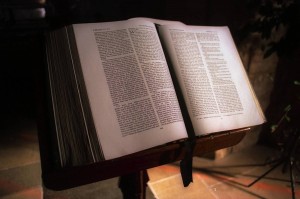
Right after a wealthy young man refused to follow Jesus, Peter, somewhat crudely wanted to know what he and the other disciples would get out of it since they had freely accepted Jesus’offer to follow him unconditionally. Jesus spoke with utter honesty: Those who left all for him would receive a hundred times more now, even in this life, as well as unending life in the age to come. Jesus’disciples can expect opposition and persecution from those who are opposed to Christ and his gospel.
Should we be surprised if we lose favor and experience ridicule, intimidation, and injury when we take a stand for truth and righteousness? In place of material wealth, Jesus promised his disciples the blessing and joy of rich fellowship with the community of believers. No earthly good or possession can rival the joy and bliss of knowing God and the peace and unity he grants to his disciples. The Lord wants to fill our hearts with the vision of heaven and with his joy and peace. Do you know the joy of following the Lord as his disciple? Ask the Holy Spirit to fill you with the joy of the gospel and the knowledge of God’s personal love.
“Lord Jesus, I want to follow you as your disciple and to love you wholeheartedly with all that I have. Fill my heart with faith, hope, and love that I may always find peace and joy in your presence.”
for the full reflection visit : Daily Reading and Meditation
Tags: catholic, catholic podcast, catholic prayer, cathollc spirituality, don schwager, gospel of mark
This entry was posted on Tuesday, March 1st, 2011 at 5:24 am
You can follow any responses to this entry through the RSS 2.0 feed.
The Eighth Monday in Ordinary Time – from the Gospel of Mark the full reading and reflection
“Whoever does not receive the kingdom of God like a child shall not enter it”
an excerpt from today’s reflection by Don Schwager: 
Those who are generous towards God and towards their neighbor find that they cannot outgive God in his generosity towards us. God blesses us with the priceless treasures of his kingdom – freedom from fear and the griping power of sin, selfishness and pride which block his love and grace in our lives; freedom from loneliness, isolation and rejection which keep his children from living together in love, peace, and unity; and freedom from hopelessness, despair, and disillusionment which blind our vision of God’s power to heal every hurt, bind every wound, and remove every blemish which mar the image of God within us. God offers us treasure which money cannot buy. He alone can truly satisfy the deepest longing and desires of our heart. Are you willing to part with anything that might keep you from seeking true joy with Jesus?
Why does Jesus issue such a strong warning to the rich (as well as to the rest of us who desire to be rich)? Was he really against wealth? We know that Jesus was not opposed to wealth per se, nor was he opposed to the wealthy. He had many friends who were well-to-do,  including some notorious tax collectors! One even became an apostle! Jesus’ warning reiterated the teaching of the Old Testament wisdom: Better is a poor man who walks in his integrity than a rich man who is perverse in his ways (Proverbs 28:6; see also Psalm 37:16). Do not wear yourself out to get rich; be wise enough to desist (Proverbs 23:4). Jesus seems to say that it is nearly impossible for the rich to live as citizens of God’s kingdom. The camel was regarded as the largest animal in Palestine. The “eye of the needle” could be interpreted quite literally or it could figuratively describe the narow and low gate of the city walls which was used by travellers when the larger public gate was locked after dark. A normal sized man had to “lower” himself to enter that gate. A camel would literally have to knell and crawl through it. Why is Jesus so cautious about wealth? Wealth can make us falsely independent. The church at Laodicea was warned about their attitude towards wealth and a false sense of security: “For you say, I am rich, I have prospered, and I need nothing” (Revelations 3:17). Wealth can also lead us into hurtful desires and selfishness (see 1 Timothy 6:9-10). Look at the lesson Jesus gave about the rich man and his sons who refused to aid the poor man Lazarus (see Luke 16:19ff). They also neglected to serve God. The scriptures give us a paradox: we lose what we keep and we gain what we give away. Generosity will be amply repaid, both in this life and in eternity (Proverbs 3:9-10, Luke 6:38). Jesus offers us an incomparable treasure which no money can buy and no thief can steal. The thing we most set our heart on is our highest treasure. Material wealth will shackle us to this earth unless we guard our hearts and set our treasure on God and his everlasting kingdom. Where is your treasure?
including some notorious tax collectors! One even became an apostle! Jesus’ warning reiterated the teaching of the Old Testament wisdom: Better is a poor man who walks in his integrity than a rich man who is perverse in his ways (Proverbs 28:6; see also Psalm 37:16). Do not wear yourself out to get rich; be wise enough to desist (Proverbs 23:4). Jesus seems to say that it is nearly impossible for the rich to live as citizens of God’s kingdom. The camel was regarded as the largest animal in Palestine. The “eye of the needle” could be interpreted quite literally or it could figuratively describe the narow and low gate of the city walls which was used by travellers when the larger public gate was locked after dark. A normal sized man had to “lower” himself to enter that gate. A camel would literally have to knell and crawl through it. Why is Jesus so cautious about wealth? Wealth can make us falsely independent. The church at Laodicea was warned about their attitude towards wealth and a false sense of security: “For you say, I am rich, I have prospered, and I need nothing” (Revelations 3:17). Wealth can also lead us into hurtful desires and selfishness (see 1 Timothy 6:9-10). Look at the lesson Jesus gave about the rich man and his sons who refused to aid the poor man Lazarus (see Luke 16:19ff). They also neglected to serve God. The scriptures give us a paradox: we lose what we keep and we gain what we give away. Generosity will be amply repaid, both in this life and in eternity (Proverbs 3:9-10, Luke 6:38). Jesus offers us an incomparable treasure which no money can buy and no thief can steal. The thing we most set our heart on is our highest treasure. Material wealth will shackle us to this earth unless we guard our hearts and set our treasure on God and his everlasting kingdom. Where is your treasure?
“Lord Jesus, you have captured our hearts and opened to us the treasures of heaven. May you always be my treasure and delight and may nothing else keep me from giving you my all.”
for the full reflection visit : Daily Reading and Meditation
Tags: catholic, catholic podcast, catholic prayer, cathollc spirituality, don schwager, eye of the needle, gospel of mark
This entry was posted on Monday, February 28th, 2011 at 7:59 am
You can follow any responses to this entry through the RSS 2.0 feed.
“Sell what you have, and give to the poor, and you will have treasure in heaven”
an excerpt from today’s reflection by Don Schwager: 
What does the expression “serving two masters†and “being anxious†have in common? They both have the same root problem – being divided within oneself. The root word for “anxiety†literally means “being of two minds.†An anxious person is often “tossed to and fro†and paralyzed by fear, indecision, and insecurity. Fear of some bad outcome cripples those afflicted with anxiety. It’s also the case with someone who wants to live in two opposing kingdoms – God’s kingdom of light, truth, and goodness or Satan’s kingdom of darkness, sin, and deception – following God’s standards and way of happiness or following the world’s standards of success and happiness. Who is the master in charge of your life? Our “master†is whatever governs our thought-life, shapes our ideals, and controls the desires of our heart and the values we choose to live by. We can be ruled by many different things – the love of money and possessions, the power of position and prestige, the glamor of wealth and fame, and the driving force of unruly passions, harmful desires, and addictive cravings. Ultimately the choice of who is our master boils down to two: God or “mammonâ€. What is mammon? “Mammon†stands for “material wealth or possessions†or whatever tends to “control our appetites and desires.â€
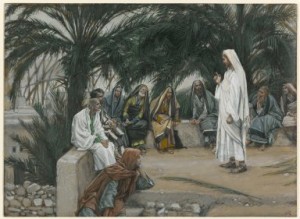 There is one master alone who has the power to set us free from slavery to sin, fear, pride, and greed, and a host of other hurtful desires. That master is the Lord Jesus Christ who alone can save us from all that would keep us bound up in fear and anxiety. Jesus used an illustration from nature – the birds and the flowers – to show how God provides for his creatures in the natural order of his creation. God provides ample food, water, light, and heat to sustain all that lives and breathes. How much more can we, who are created in the very image and likeness of God, expect our heavenly Father and creator to sustain not only our physical bodies, but our mind, heart, and soul as well? God our Father is utterly reliable because it is his nature to love, heal, forgive, and make whole again. Jesus taught his disciples to pray with confidence to their heavenly Father: Give us this day our daily bread. What is bread, but the very staple of life and symbol of all that we need to live and grow. Anxiety is neither helpful nor necessary. It robs us of faith and confidence in God’s help and it saps our energy for doing good. Jesus admonishes his followers to put away anxiety and preoccupation with material things and instead to seek first the things of God – his kingdom and righteousness. Anxiety robs the heart of trust in the mercy and goodness of God and in his loving care for us. God knows our needs even before we ask and he gives generously to those who trust in him. Who is your master – God or mammon?
There is one master alone who has the power to set us free from slavery to sin, fear, pride, and greed, and a host of other hurtful desires. That master is the Lord Jesus Christ who alone can save us from all that would keep us bound up in fear and anxiety. Jesus used an illustration from nature – the birds and the flowers – to show how God provides for his creatures in the natural order of his creation. God provides ample food, water, light, and heat to sustain all that lives and breathes. How much more can we, who are created in the very image and likeness of God, expect our heavenly Father and creator to sustain not only our physical bodies, but our mind, heart, and soul as well? God our Father is utterly reliable because it is his nature to love, heal, forgive, and make whole again. Jesus taught his disciples to pray with confidence to their heavenly Father: Give us this day our daily bread. What is bread, but the very staple of life and symbol of all that we need to live and grow. Anxiety is neither helpful nor necessary. It robs us of faith and confidence in God’s help and it saps our energy for doing good. Jesus admonishes his followers to put away anxiety and preoccupation with material things and instead to seek first the things of God – his kingdom and righteousness. Anxiety robs the heart of trust in the mercy and goodness of God and in his loving care for us. God knows our needs even before we ask and he gives generously to those who trust in him. Who is your master – God or mammon?
“Lord Jesus, free me from needless worries and help me to put my trust in you. May my first and only concern be for your glory and your kingdom of peace and righteousness. Help me to live each day and moment with trust and gratitude for your providential care for me.â€
for the full reflection visit : Daily Reading and Meditation
Tags: catholic, catholic podcast, catholic prayer, cathollc spirituality, don schwager, gospel of matthew
This entry was posted on Sunday, February 27th, 2011 at 2:51 pm
You can follow any responses to this entry through the RSS 2.0 feed.
The Seventh Saturday in Ordinary Time – from the Gospel of Mark the full reading and reflection
“Whoever does not receive the kingdom of God like a child shall not enter it”
an excerpt from today’s reflection by Don Schwager: 
Do you seek to help others draw near to the Lord? The parents who brought their children to Jesus wanted Jesus to lay his hands upon them. They knew of the healing power, both physical and spiritual, which came from Jesus’ touch. Jesus, in turn, rebuked his disciples for hindering the children from coming. No doubt the disciples wanted to shield Jesus from the nuisance of noisy children. But Jesus delighted in the children and demonstrated that God’s love has 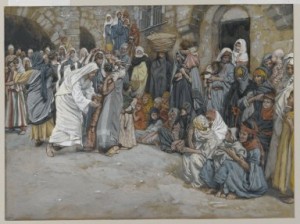 ample room for everyone. No one is unimportant to God. He comes to each person individually that he might touch them with his healing love and power. Do you show kindness to the youth you encounter in your neighborhood, home, and church and do you pray for them that they may grow in the knowledge and wisdom of Jesus Christ?
ample room for everyone. No one is unimportant to God. He comes to each person individually that he might touch them with his healing love and power. Do you show kindness to the youth you encounter in your neighborhood, home, and church and do you pray for them that they may grow in the knowledge and wisdom of Jesus Christ?
“Lord Jesus, may we never hinder our youth from coming to you to receive your blessing and healing power. Make our youth strong in faith and character that they may follow you zealously. And as we grow with age, may we never lose that child-like simplicity and humility which draws us into your loving presence.”
for the full reflection visit : Daily Reading and Meditation
Tags: catholic, catholic podcast, catholic prayer, cathollc spirituality, don schwager, gospel of mark
This entry was posted on Saturday, February 26th, 2011 at 12:48 am
You can follow any responses to this entry through the RSS 2.0 feed.
The Seventh Friday in Ordinary Time – from the Gospel of Mark the full reading and reflection
“What God has joined together, let no man put asunder”
an excerpt from today’s reflection by Don Schwager: 
What is God’s intention for our state in life, whether married or single? Jesus deals with the issue of divorce by taking his hearers back to the beginning of creation and to God’s plan for the human race. In Genesis 2:23-24 we see God’s intention and ideal that two people who marry should become so indissolubly one that they are one flesh. That ideal is found in the unbreakable union of Adam and Eve. They were created for each other and for no one else. They are the pattern and symbol for all who were to come. Jesus explains that Moses permitted divorce as a concession in view of a lost ideal. Jesus sets the high ideal of the married state before those who are willing to accept his commands. Jesus, likewise sets the high ideal for those who freely renounce marriage for the sake of the kingdom of heaven (Matthew 19:11-12). Both marriage and celibacy are calls from God to live a consecrated life, that is to live as married couples or as singles who belong not to themselves but to God. Our lives are not our own, but they belong to God. He gives the grace and power to those who seek to follow his way of holiness in their state of life. Do you seek the Lord and his grace in your state of life?
“Lord Jesus Christ, your call to holiness extends to all in every state of life. Sanctify our lives – as married couples and as singles – that we may live as men and women who are consecrated to you. Make us leaven in a society that disdains life-long marriage fidelity, chastity, and living single for the Lord”.
for the full reflection visit : Daily Reading and Meditation
Tags: catholic, catholic podcast, catholic prayer, cathollc spirituality, divorce, don schwager, gospel of mark, marriage
This entry was posted on Friday, February 25th, 2011 at 12:11 am
You can follow any responses to this entry through the RSS 2.0 feed.
The Seventh Thursday in Ordinary Time – from the Gospel of Mark the full reading and reflection
an excerpt from today’s reflection by Don Schwager: 
Was Jesus’ exaggerating when he urged his followers to use drastic measures to avoid evil and its harmful consequences? Jesus set before his disciples the one supreme goal in life that is worth any sacrifice, and that goal is God himself and his will for our lives which leads to everlasting peace and happiness. Just as a doctor might remove a limb or some part of the body in order to preserve the life of the whole body, so we must be ready to part with anything that causes us to sin and which leads to spiritual death. Jesus warns his disciples of the terrible responsibility that they must set no stumbling block in the way of another, that is, not give offense or bad example that might lead another to sin. The Greek word for temptation (scandalon) is exactly the same as the English word scandal. The original meaning of scandal is a trap or a stumbling block which causes one to trip and fall. The Jews held that it was an unforgivable sin to teach another to sin. If we teach another to sin, he in turn may teach still another, until a train of sin is set in motion with no foreseeable end. The young in faith are especially vulnerable to the bad example of those who should be passing on the faith. Do you set a good example for others to follow, especially the young?
What does Jesus mean when he says “have salt in yourselves”? Salt served a very useful purpose in hot climates before the invention of electricity and refrigeration. Salt not only gave food flavor, it also preserved meat from spoiling. Salt was used as a symbol of fellowship and the common meal. The n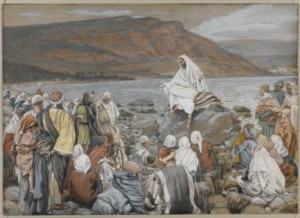 ear-Eastern expression to betray the salt meant to betray one’s Master or some person who was owed loyalty and devotion. Leonardo da Vinci in his painting of the Last Supper depicts Judas in the act of tipping over the salt shaker, thus symbolically indentifying himself as the betrayer of his Master. Jesus used the image of salt to describe how his disciples are to live in the world. As salt purifies, preserves, and penetrates, so the disciple must be as salt in the world of human society to purify, preserve, and penetrate that society for the kingdom of God and of his righteousness and peace. What did Jesus mean by the expression “salted with fire” and “salt becoming saltless”? Salt was often put in ovens to intensify the heat. When the salt was burned off and no longer useful it was thrown out on the road or on the roof top where it would easily get trodden upon. Perhaps Jesus wanted to contrast useful salt used for giving flavor and for preserving food with salt which was burned and no longer of much benefit, to encourage his disciples to be faithful witnesses and to not neglect the opportunity to influence others for the kingdom of God through the witness of their lives and their testimony to the power of the kingdom of God.
ear-Eastern expression to betray the salt meant to betray one’s Master or some person who was owed loyalty and devotion. Leonardo da Vinci in his painting of the Last Supper depicts Judas in the act of tipping over the salt shaker, thus symbolically indentifying himself as the betrayer of his Master. Jesus used the image of salt to describe how his disciples are to live in the world. As salt purifies, preserves, and penetrates, so the disciple must be as salt in the world of human society to purify, preserve, and penetrate that society for the kingdom of God and of his righteousness and peace. What did Jesus mean by the expression “salted with fire” and “salt becoming saltless”? Salt was often put in ovens to intensify the heat. When the salt was burned off and no longer useful it was thrown out on the road or on the roof top where it would easily get trodden upon. Perhaps Jesus wanted to contrast useful salt used for giving flavor and for preserving food with salt which was burned and no longer of much benefit, to encourage his disciples to be faithful witnesses and to not neglect the opportunity to influence others for the kingdom of God through the witness of their lives and their testimony to the power of the kingdom of God.
“Lord Jesus, fill me with your Holy Spirit that I may radiate the joy of the gospel to others. May your light and truth shine through me that others may find new life and freedom from sin and the corruption of evil.”
for the full reflection visit : Daily Reading and Meditation
Tags: catholic, catholic podcast, catholic prayer, cathollc spirituality, don schwager, gospel of mark, Jesus, Lord Jesus, stumbling block
This entry was posted on Thursday, February 24th, 2011 at 6:00 am
You can follow any responses to this entry through the RSS 2.0 feed.
The Seventh Wednesday in Ordinary Time – from the Gospel of Mark the full reading and reflection
“No one who does a mighty work in my name will be able soon after to speak evil of me”
an excerpt from today’s reflection by Don Schwager: 
Do you rejoice in the good that others do? Jesus reprimands his disciples for their jealousy and suspicion. They were upset that someone who was not of their company was performing a spiritual work in the name of Jesus. They even “forbade” the man “because he was not following us”. Jesus’ reply is filled with wisdom: “No one who does a mighty work in my name will be able soon after to speak evil of me.” Are we not like the disciples when we get upset at the good deeds of others who seem to shine more than us? Paul says that “love is not jealous… but rejoices in the right” (1 Corinthians 13:4,6). Envy and jealousy, its counterpart, are sinful because they lead us to sorrow over what should make us rejoice – namely, our neighbor’s good. The reason we may grieve over our another’s good is that somehow we see that good as lessening our own value or excellence. Envy forms when we believe that the other person’s advantage or possession diminishes or brings disgrace on us. Envy is contrary to love. Both the object of love and the object of envy is our neighbor’s good, but by contrary movements, since love rejoices in our neighbor’s good, while envy grieves over it. How can we overcome envy? With the love that God has put into our hearts through the gift of the Holy Spirit (Romans 5:5). The Holy Spirit purifies our love and frees us from our disordered passions, such as envy, jealously, greed, and bitterness. The love that God places in our hearts seeks the highest good of our neighbor. Ask the Lord to transform your heart that you may always rejoice in the good of others, even in those you find disagreeable.
ord Jesus, your love knows no bounds. Free my heart of all jealousy, pride, fear, and possessiveness, that I may always love others and treat them as you have treated me – with loving-kindness, goodness, mercy, thoughfulness, and generous care.”
for the full reflection visit : Daily Reading and Meditation
Tags: catholic, catholic podcast, catholic prayer, cathollc spirituality, don schwager, gospel of mark
This entry was posted on Wednesday, February 23rd, 2011 at 12:11 am
You can follow any responses to this entry through the RSS 2.0 feed.
The Seventh Monday in Ordinary Time – from the Gospel of Matthew the full reading and reflection
“Flesh and blood has not revealed this to you, but my Father who is in heaven”
an excerpt from today’s reflection by Don Schwager: 
At an opportune time Jesus tests his disciples with a crucial question: Who do men say that I am and who do you say that I am? He was widely recognized in Israel as a mighty man of God, even being compared with the greatest of the prophets, John the Baptist, Elijah, and Jeremiah. Peter, always quick to respond, exclaimed that he was the Christ, the Son of the living God. No mortal being could have revealed this to Peter; but only God. Jesus then confers on Peter authority to govern the church that Jesus would build, a church that no powers would overcome. Jesus plays on Peter’s name which is the same word for “rock” in both Aramaic and Greek. To call 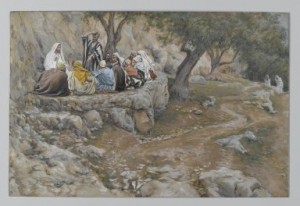 someone a “rock” is one of the greatest of compliments. The ancient rabbis had a saying that when God saw Abraham, he exclaimed: “I have discovered a rock to found the world upon”. Through Abraham God established a nation for himself. Through faith Peter grasped who Jesus truly was. He was the first apostle to recognize Jesus as the Anointed One (Messiah and Christ) and the only begotten Son of God. The New Testament describes the church as a spiritual house or temple with each member joined together as living stones (see 1 Peter 2:5). Faith in Jesus Christ makes us into rocks or spiritual stones. The Lord Jesus tests each of us personally with the same question: Who do you say that I am?
someone a “rock” is one of the greatest of compliments. The ancient rabbis had a saying that when God saw Abraham, he exclaimed: “I have discovered a rock to found the world upon”. Through Abraham God established a nation for himself. Through faith Peter grasped who Jesus truly was. He was the first apostle to recognize Jesus as the Anointed One (Messiah and Christ) and the only begotten Son of God. The New Testament describes the church as a spiritual house or temple with each member joined together as living stones (see 1 Peter 2:5). Faith in Jesus Christ makes us into rocks or spiritual stones. The Lord Jesus tests each of us personally with the same question: Who do you say that I am?
“Lord Jesus, I profess and believe that you are the Christ, the Son of the living God. You are my Lord and my Savior. Make my faith strong like Peter’s and give me boldness to speak of you to others that they may come to know you personally as Lord and Savior and grow in the knowledge of your love”.
for the full reflection visit : Daily Reading and Meditation
Tags: catholic, catholic podcast, catholic prayer, cathollc spirituality, don schwager, gospel of matthew
This entry was posted on Tuesday, February 22nd, 2011 at 5:38 am
You can follow any responses to this entry through the RSS 2.0 feed.
The Seventh Monday in Ordinary Time – from the Gospel of Mark the full reading and reflection
“All things are possible to him who believes”
an excerpt from today’s reflection by Don Schwager: 
When Jesus rebuked the evil spirit, the boy, at first, seemed to get worse rather than better as he went into a fit of convulsion. Peter Chrysologus, a 5th century church father, reflects on this incident: “Though it was the boy who fell on the ground, it was the devil in him who was in anguish. The possessed boy was merely convulsed, while the usurping spirit was being convicted by the awesome judge. The captive was detained, but the captor was punished. Through the wrenching of the human body, the punishment of the devil was made manifest.†God promises us freedom from oppression, especially the oppression of sin and evil that rob us of faith, joy, and peace with God. The Lord invites us, as he did this boy’s father, to pray with expectant faith. Do you trust in God’s unfailing love and mercy?
The mighty works and signs which Jesus did demonstrate that the kingdom of God is present in him. These signs attest that the Father has sent him as the promised Messiah. They invite belief in Jesus as the Son of God and Savior of the world. The coming of God’s kingdom means defeat of Satan’s kingdom. Jesus’ exorcisms anticipate his great victory over “the ruler of this world” (John 12:31). While Satan may act in the world out of hatred for God and his kingdom in Christ Jesus, and may cause grave injuries of a spiritual nature, and indirectly even of a physical nature, his power is nonetheless limited and permitted by divine providence (Romans 8:28). Jesus offers freedom from bondage to sin and Satan. There is no affliction he cannot deliver us from. Do you make full use of the protection and help he offers to those who seek him with faith and trust in his mercy?
“Lord Jesus, help my unbelief! Increase my faith and trust in your saving power. Give me confidence and perseverance, especially in prayer. And help me to bring your healing love and truth to those I meet”.
for the full reflection visit : Daily Reading and Meditation
Tags: belief in Jesus, catholic, catholic podcast, catholic prayer, cathollc spirituality, don schwager, exorcisms, gospel of mark, Lord Jesus, Peter Chrysologus
This entry was posted on Monday, February 21st, 2011 at 12:35 am
You can follow any responses to this entry through the RSS 2.0 feed.
The Seventh Sunday in Ordinary Time – from the Gospel of Matthew the full reading and reflection
“Be perfect, as your heavenly Father is perfect”
an excerpt from today’s reflection by Don Schwager: 
Jesus does something quite remarkable and unheard of. He transforms the law of mercy with grace and loving-kindness. Jesus also makes clear that there is no room for retaliation. We must not only avoid returning evil for evil, but we must seek the good of those who wish us ill. Do you accept insults, as Jesus did, with no resentment or malice? When you are compelled by others to do more than you think you deserve, do you insist on your rights, or do you respond with grace and cheerfulness?
What makes Christians different from others and what makes Christianity distinct from any other religion? It is grace – treating others, not as they deserve, but as God wishes them to be treated – with loving-kindness and mercy. God is good to the unjust as well as the just. His love embraces saint and sinner alike. God seeks our highest good and teaches us to seek the greatest good of others, even those who hate and abuse us. Our love for others, even those who are ungrateful and selfish towards us, must be marked by the same kindness and mercy which God has shown to us. It is easier to show kindness and mercy 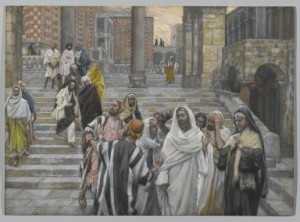 when we can expect to benefit from doing so. How much harder when we can expect nothing in return. Our prayer for those who do us ill both breaks the power of revenge and releases the power of love to do good in the face of evil. How can we possibly love those who cause us harm or ill-will? With God all things are possible. He gives power and grace to those who believe and accept the gift of the Holy Spirit. His love conquers all, even our hurts, fears, prejudices and griefs. Only the cross of Jesus Christ can free us from the tyranny of malice, hatred, revenge, and resentment and gives us the courage to return evil with good. Such love and grace has power to heal and to save from destruction. Do you know the power of Christ’s redeeming love and mercy?
when we can expect to benefit from doing so. How much harder when we can expect nothing in return. Our prayer for those who do us ill both breaks the power of revenge and releases the power of love to do good in the face of evil. How can we possibly love those who cause us harm or ill-will? With God all things are possible. He gives power and grace to those who believe and accept the gift of the Holy Spirit. His love conquers all, even our hurts, fears, prejudices and griefs. Only the cross of Jesus Christ can free us from the tyranny of malice, hatred, revenge, and resentment and gives us the courage to return evil with good. Such love and grace has power to heal and to save from destruction. Do you know the power of Christ’s redeeming love and mercy?
Was Jesus exaggerating when he said we must be perfect as our heavenly Father is perfect? The original meaning of “perfect†in Aramaic is “completeness†or “wholeness – not lacking in what is essential.†God gives us every good gift in Jesus Christ so that we may not lack anything we need to do his will and to live as his sons and daughters (2 Peter 1:3). He knows our weakness and sinfulness better than we do. And he assures us of his love, mercy, and grace to follow in his ways. Do you want to grow in your love for God and for your neighbor? Ask the Holy Spirit to change and transform you in the image of the Father that you may walk in the joy and freedom of the gospel.
“Lord Jesus, your love brings freedom and pardon. Fill me with your Holy Spirit and set my heart ablaze with your love that nothing may make me lose my temper, ruffle my peace, take away my joy, nor make me bitter towards anyone.â€
for the full reflection visit : Daily Reading and Meditation
Tags: catholic, catholic podcast, catholic prayer, cathollc spirituality, don schwager, gospel of matthew, seventh sunday in ordinary time
This entry was posted on Sunday, February 20th, 2011 at 9:21 am
You can follow any responses to this entry through the RSS 2.0 feed.
The Sixth Friday in Ordinary Time – from the Gospel of Mark the full reading and reflection
“Whoever loses his life for my sake and the gospel’s will save it”
an excerpt from today’s reflection by Don Schwager: 
Jesus asks the question: What will a person give in exchange for his life? Everything we have is an out-right gift from God. We owe him everything, including our very lives. It’s possible to give God our money, but not ourselves, or to give him lip-service, but not our hearts. A true disciple gladly gives up all that he or she has in exchange for an unending life of joy and happiness with God. God gives without measure. The joy he offers no sadness or loss can diminish. The cross of Christ leads to victory and freedom from sin and death. What is the cross which Jesus Christ commands me to take up each day? When my will crosses with his will, then his will must be done. Are you ready to lose all for Jesus Christ in order to gain all with Jesus Christ?
“Lord Jesus Christ, I want to follow you as your disciple. I gladly offer all that I have to you. Take and use my life as a pleasing sacrifice of praise to your glory.”
for the full reflection visit : Daily Reading and Meditation
Tags: catholic, catholic podcast, catholic prayer, cathollc spirituality, don schwager, gospel of mark
This entry was posted on Friday, February 18th, 2011 at 7:41 am
You can follow any responses to this entry through the RSS 2.0 feed.
The Sixth Thursday in Ordinary Time – from the Gospel of Mark the full reading and reflection
“But who do you say that I am?”
an excerpt from today’s reflection by Don Schwager: 
Who is Jesus for you? At an opportune time Jesus tests his disciples with a crucial question: Who do men say that I am and who do you say that I am? He was widely recognized in Israel as a mighty man of God, even being compared with the greatest of the prophets, John the Baptist, Elijah, and Jeremiah. Peter, always quick to respond, professes that Jesus is truly the Christ. No mortal being could have revealed this to Peter; but only God.Through faith Peter grasped who Jesus truly was. He was the first apostle to recognize Jesus as the Anointed One (Messiah and Christ). Christ is the Greek word for the Hebrew word Messiah, which means Anointed One. Peter’s faith, however was sorely tested when Jesus explained that it was necessary for the Messiah to suffer and die in order that God’s work of redemption may be accomplished. How startled the disciples were when they heard these words! How different are God’s thoughts and ways from our thoughts and ways! Through humiliation, suffering, and death on the cross Jesus broke the powers of sin and death and won for us our salvation. The Lord Jesus tests each of us personally with the same question: Who do you say that I am?
“Lord Jesus, I profess and believe that you are the Christ, the Son of the living God. You are my Lord and my Savior. Make my faith strong and help me to live in the victory of the cross by rejecting sin and by accepting your will.”
for the full reflection visit : Daily Reading and Meditation
Tags: catholic, catholic podcast, catholic prayer, cathollc spirituality, don schwager, gospel of mark
This entry was posted on Thursday, February 17th, 2011 at 12:42 am
You can follow any responses to this entry through the RSS 2.0 feed.
The Sixth Wednesday in Ordinary Time – from the Gospel of Mark the full reading and reflection
“The blind man looked intently and was restored, and saw everything clear”
an excerpt from today’s reflection by Don Schwager: 
What’s worse than physical blindness? Blindness of heart and soul for sure! A blind man is led to Jesus by some of his friends. Without their help he could not have found the one who could restore his sight. Jesus understood the fears and hopes of this blind man who begged him to touch him. The blind in a special way perceive the power of touch. Jesus shows considerateness in bringing this man to a place away from the skeptics and gawkers. His sight is restored in stages as he responds to Jesus’ healing touch. Mark records this remarkable miracle in three short phrases: He looked intently and was restored, and saw everything clearly. Jesus sent him home with a warning to avoid the company of those who live in spiritual darkness. Are there any blindspots in your life that cloud your vision of God and his kingdom? Allow the Lord Jesus to touch you with his grace and power that you may walk in the light of his redeeming truth and love.
Jerome, an early church bible scholar (347-420 AD), explains the spiritual significance of this healing for us: “Christ laid his hands upon his eyes that he might see all things clearly, so through visible things he might understand things invisible, which the eye has not seen, that after the film of sin is removed, he might clearly behold the state of his soul with the eye of a clean heart.”
“Lord Jesus, open my eyes to the revelation of your healing presence and saving word. Help me to walk according to your truth and to not stumble in the darkness of sin. May I help others find your healing light and saving presence.”
for the full reflection visit : Daily Reading and Meditation
Tags: catholic, catholic podcast, catholic prayer, cathollc spirituality, don schwager, gospel of mark
This entry was posted on Wednesday, February 16th, 2011 at 12:55 am
You can follow any responses to this entry through the RSS 2.0 feed.
The Sixth Monday in Ordinary Time – from the Gospel of Mark the full reading and reflection
“No sign shall be given to this generation”
an excerpt from today’s reflection by Don Schwager: 
The Lord reveals himself and makes his presence known to us in many ways – in his word and in the “breaking of the bread” in the Eucharist, in his church – the body of Christ, in his creation, and even in the everyday circumstances of our lives. If we seek the Lord, we will surely find him. And we can be confident that he will give us whatever we need to understand and carry out his will. Most of all the Lord assures us of his daily presence and the promise that he will never leave us. Theresa of Avila’s prayer book contained a bookmark which she wrote: Let nothing disturb you, let nothing frighten you; All things pass: God never changes. Patience achieves all it strives for. Whoever has God lacks nothing, God alone suffices. Is God enough for you?
“Lord Jesus, may I always recognize your saving presence in my life and never forget your promises when I encounter trials and difficulties. Give me a faith that never wavers, a hope that never fades, and a love that never grows cold.”
for the full reflection visit : Daily Reading and Meditation
Tags: catholic, catholic podcast, catholic prayer, cathollc spirituality, don schwager, gospel of mark
This entry was posted on Monday, February 14th, 2011 at 12:52 am
You can follow any responses to this entry through the RSS 2.0 feed.
The Fifth Friday in Ordinary Time – from the Gospel of Mark the full reading and reflection
“He has done all things well; he even makes the deaf hear and the dumb speak”
an excerpt from today’s reflection by Don Schwager: 
What is the significance of Jesus putting his fingers into the man’s ears? Gregory the Great, a church father from the 6th century, comments on this miracle: “The Spirit is called the finger of God. When the Lord puts his fingers into the ears of the deaf mute, he was opening the soul of man to faith through the gifts of the Holy Spirit.â€
The people’s response to this miracle testifies to Jesus’ great care for others: He has done all things well. No problem or burden was too much for Jesus’ careful consideration. The Lord treats each of us with kindness and compassion and he calls us to treat one another in like kind. The Holy Spirit who dwells within us enables us to love as Jesus loves. Do you show kindness and compassion to your neighbors and do you treat them with considerateness as Jesus did?
“Lord Jesus, fill me with your Holy Spirit and inflame my heart with love and compassion. Make me attentive to the needs of others that I may show them kindness and care. Make me an instrument of your mercy and peace that I may help others find healing and wholeness in you.”
for the full reflection visit : Daily Reading and Meditation
Tags: catholic, catholic podcast, catholic prayer, cathollc spirituality, don schwager, gospel of mark
This entry was posted on Friday, February 11th, 2011 at 12:01 am
You can follow any responses to this entry through the RSS 2.0 feed.
